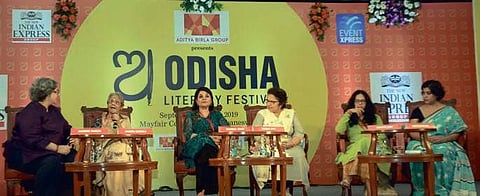

BHUBANESWAR: Are women voices emerging in the Indian literary scene?
Authors Shanta Gokhale, Kishwar Desai, Minnie Vaid, Samhita Arni and Deepanjana Pal speaking at the ‘Women’s Voices: Waiting to be Heard’ session of Odisha Literary Festival had diverse answers to the question. Deepanjana, Shanta and Samhita viewed that gender as a narrative is changing in Indian literature.
Although more and more women writers are writing about women subjects these days and the tribe of women writers is increasing, it still has a long way to go.
Deepanjana, author of crime fiction ‘Hush a Bye Baby’, said a lot of things in her book is about the inherent sexism that women face everyday, be it homemakers or writers.
“As an industry, the English publishing scene is largely women-dominated and that has created a space for women writers. But a woman writer still cannot make a living from just writing. Besides, there are no diverse voices in women’s writing. We have had the same kind of women writers and more or less the same subjects but we should look beyond that”, she said, adding that there should be more Dalit, tribal and Muslim women writers in the country today.
Shanta, also a playwright and theatre critic, shared her experiences and struggles as a woman writer while Kishwar spoke about her idea of writing a play on Devika Rani, the trailblazing actress who changed the perception of women in Indian cinema.
Similarly, Samhita who has been writing about women characters in Indian mythology, spoke about her latest book, ‘The Prince’ where she attempts to delve into the rage of the central character Kannagi who took revenge on the Pandyan King of Madurai as he had wrongfully put her husband Kovalan to death. She said the expression of emotion in Indian literature is very gendered.
Minnie, author of ‘Those Magnificent Women and their Flying Machines: ISRO’S Mission to Mars’ that
released this year, said during the process of writing her novel on ISRO’s women scientists, she found out that they have taken their gender tag very lightly.
“I was struck by the attitude of the women scientists who despite sending rockets to moon, feel that managing home is also their responsibility.
While interviewing women scientists associated with Mangalyaan, I saw that they were very casual about working day and night on the Mars Orbiter Mission and also looking after their families and children”, she said.
However, Minnie felt that the times have changed for women writers. They, she said, are not just shining torches on various issues, people and subjects that men writers would not dare to do. This is the time for women writing in India.